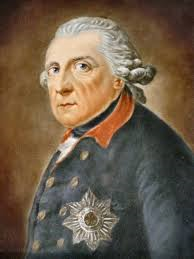Frederick the Great
Contents
Country
Prussian
Birth - Death
1712 - 1786
Occupation
Politics
Notable Achievements
Head of State
Description
Frederick II, King of Prussia from 1740 until 1786, was a revered military leader, public administrator, and patron of the arts. His reputation and favour was so great he was accorded the nickname Frederick the Great. His success as head of state made Prussia a leading nation in Europe during his lifetime and afterward.
Frederick was born into the aristocracy and was raised in a privileged, though violent, family environment. Despite his dominating father, he was intent on learning the Greek and Roman classics, French philosophy, and Calvinist religion. At an early age he was noted for his effete personality (opting to speak only French, for example) and he preferred the company of men to women. When his mother tried to marry him off, he ran away with his intimate friend Hans Hermann von Katte – they were caught, and his father had Hans executed in front of Frederick’s eyes.
After a period of strict military and administrative training, Frederick was married off to Elisabeth Christine of Austria, much to his resentment and personal distaste for her. The marriage was loveless and bore no heirs.
With the death of his father in 1740, Frederick assumed the crown at age 28. At this time, Prussia consisted of a number of loosely aligned territories. Frederick set upon himself the task of formally integrating these territories into a cohesive whole, accomplished by both military activity and administrative oversight. He quickly invaded and occupied Silesia, despite the objections of Austria and Poland. This was followed by the acquisition of Bohemia in 1744-45.
In 1756, Frederick instigated the Seven Years War in alliance with Great Britain against France, Russia, and Austria. At the end, Prussia did not gain further territory, but its victory provided absolute authority over its existing territories and solidified Prussia’s position as a leading nation of Europe. It also made him very popular among the German-speaking territories. His success gave him the reputation as a brilliant military strategist and tactician.
Another of his successes followed with the partition of Poland with Russia in 1772. This gave Prussia control over much Polish territory. Frederick began an intensive program of removing Polish people from this occupied land.
Throughout, Frederick focussed on creating a modern and efficient administrative and legal bureaucracy to govern the country. This allowed him to solidify Prussia as a dominant and respected power in Europe while providing funds to finance his military and war programs.
Frederick was a noted supporter of the arts and culture. He made French the official language and endorsed philosophy as a prominent field of study. Frederick vastly increased Prussia’s wealth.
There is little dispute over Fredrick’s homosexuality. When his father died, he immediately separated from his wife and had no further relationships with women. His close relationship with the executed Hans was known to be romantic. Frederick established a close relationship with philosopher Voltaire, who in turn is believed to be the anonymous author of a book detailing Frederick’s homosexuality. Some historians simply argued that Frederick was too engrossed in his military activity to bother with women, but this is more a romantic notion to bolster his public persona and endearment.
Why would being homosexual diminish the idea of an individual as being physically strong and adept in military affairs? Frederick himself saw his persona as being the archetypical enlightened ruler linking military victory with a program of the advancement of arts and culture.
Frederick shaped the history of Europe during his lifetime. He combined a rag-tag group of territories and, in a short period of time, made it a military powerhouse which survived until the fall of the Nazi regime in 1945. His military prowess created a strong legacy of devotion to the Germany that coalesced with Prussia at its core, and which carried through to the 20th century. He was called The Great for both these military achievements and his intellectual and cultural achievements.

